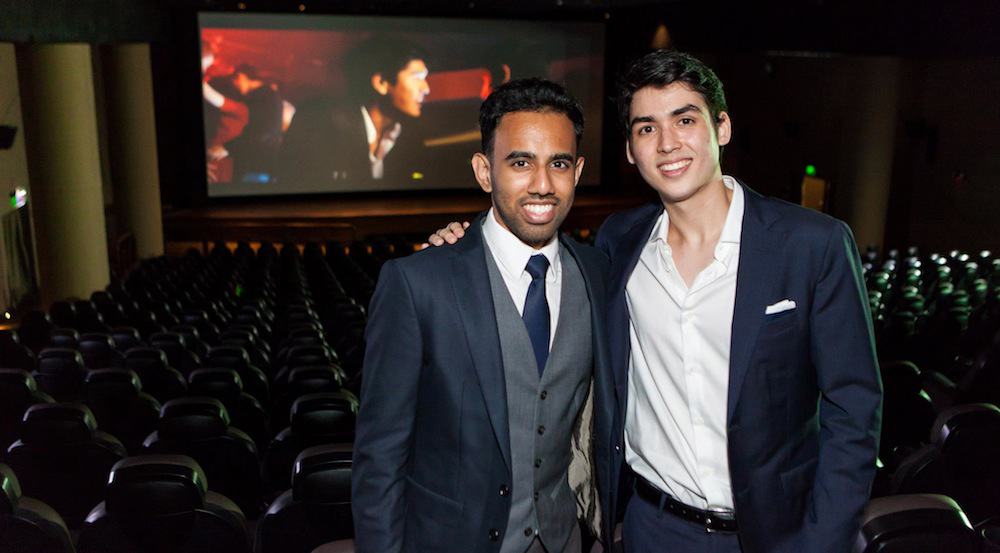Ivy Leagues; VIP booths; scholars; ballers; and one big, fat lie: welcome to the world of Acceptance (2013).
Set in Singapore, Acceptance follows the story of Rohan Patel, a student from India in a highly competitive high school, whose students consider Cornell the lowest of the Ivy League schools, an undergraduate safety school. Patel has the university application process down to a science: tailor your application, and your answers, to fit the personality of the school. Sincerity, and passion? Those are for the naïve.
After being rejected by most of the Ivy League schools to which he applied, Patel announces he was accepted at Harvard, whose admissions decisions have been delayed, to preserve his damaged ego. Consequently, he watches the repercussions of his lie tear his friendships apart, gain him a spot with the coolest kids in school, and ultimately make him question the kind of person he is.
Emotional, tense, and witty, the most impressive part about Acceptance is that it was written, produced, and directed entirely by students. Three years of hard work and dedication has resulted in a monumental achievement for aspiring filmmakers, Vishnu Hari, who is a U of T student, and Yale student Ryan Matthew Chan.
Acceptance reflects the realities of the world we live in today — the intense pressure to be the best, the stiff competition, and the too few spots available for the places of our dreams.
After the film’s University of Toronto premiere last Monday at Innis Town Hall, Hari and Chan spoke to The Varsity about the experience of being first time filmmakers, the story behind Acceptance, and what it takes to keep it together on set.
The Varsity: Where did the idea for Acceptance come from?
Vishnu Hari: Acceptance is based on a true story. The kid who lied about getting into Harvard was me. I was educated in one of the most competitive institutions in the world in Singapore, in an unforgiving Asian educational system where social worth and reputation was tied to grades and “brand name” school acceptances.
At that time, I’d been working with Ryan (who attended another international school) on small student short films. Aside from our mutual love for film, we were both highly ambitious. Naturally, Ivy League strategies and SAT scores dominated our friendly conversations.
However, when the results day came around, I got rejected from my top choice, Harvard. I simply couldn’t handle it. Unlike the protagonist of the film, I only lied to Ryan, who had gotten into Yale, when he asked me which college I was going to. The script came about as a result of me trying to figure out for myself why I’d lied to my best friend. I saw my own bruised ego in Rohan Patel. Jealousies, insecurities, and angst all came out, and we’ve tried to write those feelings into the film.
Ryan Matthew Chan: Acceptance is based off of a shared high school experience. Vishnu and I attended different schools, but we were both very goal-bound kids striving to get into the top American universities, and felt the emotional impact of the college rat race.
For us, making Acceptance was really a way to find closure to a hauntingly beautiful youth in Singapore. As co-writers, the two of us infused the story with our own personal experiences. I attended South East Asia’s largest international school, notorious for boasting a strange combination of intellectuals and bottle-popping tycoon children.
The whole “scholar” philosophy, a term thrown around a lot in Acceptance, comes directly from my group of friends in high school. The word “scholar” came to describe tragically flawed human beings with a flare for the dramatic. Suffice it to say, Vishnu and I fit this category.
The term grew pretty popular among our networks, so we decided to incorporate “scholar culture” into the film. Blake Bacher, one of the VIP nightclubbers from Acceptance, says to Rohan Patel at a pivotal moment in the film: “I love you man, I really do but… you’re not us… you’re not a baller… you’re something better. You’re a scholar.”
This line is very telling of the world from which we came — a strange atmosphere of intense academic ambition contrasted against an opulent world of excess and exclusivity.

TV: As a first-time writer and director respectively of a bigger budget film, how would you describe your experience?
VH: Gruelling. Ryan and I spent a year and half polishing the 50-page screenplay over Skype. We had to forgo parties so we could sit and write. We went through hundreds of drafts, major story shifts, character changes, and dialogue revisions to get it to the level where we were confident we could pull it off.
RMC: I was very nervous prior to directing Acceptance. Vishnu and I were rewriting the script constantly, because we were learning the trade as we went along. Every time we made a leap in our writing ability, we would have to “upgrade” and re-polish the whole script. It definitely was obsessive, but I wasn’t willing to film something that I knew could be better.
I remember three weeks before the shoot I was crippled by fear. I didn’t know if I was being delusional by attempting something as large as Acceptance.
Directing the clubbing scenes was probably the scariest thing I had to do during Acceptance. The challenge that comes with directing is if you screw up one scene, your whole film might not make any sense. There was a lot of pressure not only to get the scene right, but also to finish within a very tight time constraint and somehow make the magic feel real.
It was definitely a daunting task, but luckily I had such an amazing group of collaborators to cover up all my mistakes.
TV: What was the biggest lesson you learned?
VH: Persistence in the face of overwhelming odds. And how fucking hard it is to make a film.
RMC: If it seems impossible, the project is worth fighting for.

TV: You had a film premiere in Singapore. What was the response to the film?
VH: We initially planned for a 300-seater, but when the trailer was released, the news of the premiere and the film went viral. We went over-capacity on the guest-list and had to upgrade to a 500-seat theatre. People seemed to have enjoyed the film according to what they told us after the premiere, but you never really know…
RMC: The response was very good, but, as Vishnu mentioned, we’ll never really know for sure. Feedback from film festivals, on the other hand, has been quite problematic due to our 50-minute time length, which is difficult for a festival to program.
TV: What would your advice be to all the aspiring filmmakers out there?
VH: In the words of the twentieth-century philosopher-poet Vanilla Ice; “Stop, Collaborate, and Listen.”
RMC: “Work with people who are better than you. You’ll love trusting them.”
Acceptance (2013)
Directed by Ryan Matthew Chan
Screenplay by Vishnu Hari & Ryan Matthew Chan
Produced by Ryan Matthew Chan & Jon Ng
Cinematography by Christopher Ripley
Starring: Vinesh Nagrani, Ethan Song, Pierre Cassini, Clay Burell, Nathan Hartono and Ann Mayo-Smith
A SCHOLAR EDITION PRODUCTION


